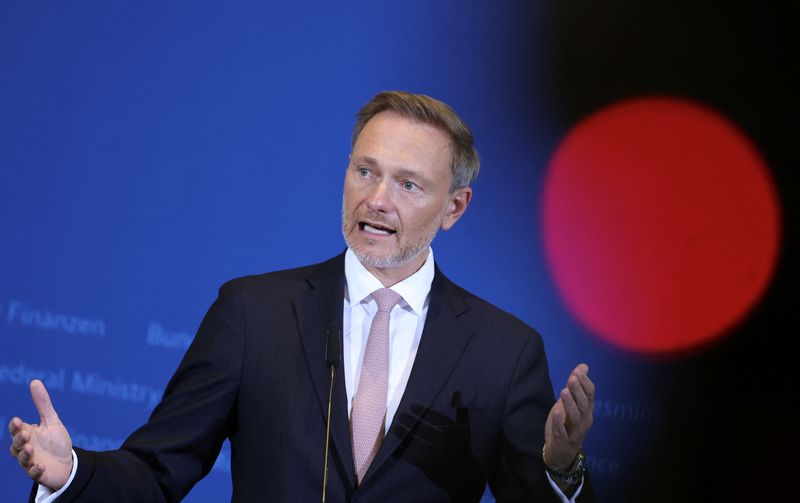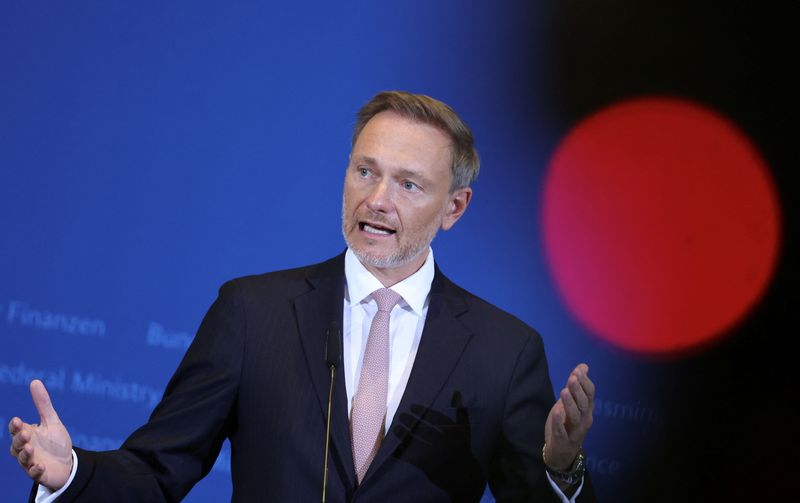Economy
German court deals 60 billion euro budget blow to Scholz government


© Reuters. German Finance Minister Christian Lindner is pictured next to the recording light of a TV camera as he presents Germany’s new tax revenue estimates in Berlin, Germany, October 26, 2023. REUTERS/Liesa Johannssen/File Photo
By Maria Martinez and Christian Kraemer
BERLIN (Reuters) -The German government froze major spending pledges focused on green initiatives and industry support on Wednesday after a constitutional court ruling on unused pandemic emergency funds blew a 60 billion euro ($65 billion) hole in its finances.
The decision threw into disarray budget negotiations taking place this week within Chancellor Olaf Scholz’s three-way ruling coalition, whose popularity has slumped as Europe’s biggest economy teeters close to another recession.
Wednesday’s decision by the constitutional court could also set a precedent for fiscal responses to future crises.
Finance Minister Christian Lindner will meanwhile face increased scrutiny over how he plans to keep spending in check, just days before he is due to meet his French counterpart for talks on enforcing fiscal discipline across the European Union.
Germany has hitherto burnished its reputation as the defender of sustainable financing in negotiations to reform EU fiscal rules in a pan-European deal by the end of the year.
Scholz said the ruling on Wednesday would have far-reaching consequences for the government’s Climate and Transformation Fund (KTF) but that his coalition would look for other sources of funding.
“We will now quickly revise the economic plan, incorporate the necessary changes and adopt new ones,” he said on social media.
Lindner said the ruling could have a big impact on federal and state budgets but the government would respect the decision and not interrupt the process of finalising the budget for 2024.
The 60 billion euros had been earmarked for initiatives such as making buildings more energy efficient and subsidising renewable electricity and chips production, as well as supporting energy-intensive companies.
Lindner said moves to promote energy efficiency and renewable energy use in the building sector would be excluded from the freeze.
But he may face growing calls from within the coalition to suspend Germany’s constitutionally enshrined debt brake again, something he has hitherto ruled out, along with raising taxes.
“This ruling will come as a massive setback to the government. The practice that was now dismissed by the court had allowed the government to forge policy compromises that kept all three parties in Scholz’s coalition satisfied,” said a note by the Eurasia group.
“Spending cuts now look unavoidable and Eurasia Group believes that the bulk of the cuts will likely hit climate-related projects.”
“FAR-REACHING CONSEQUENCES”
Scholz’s centre-left Social Democrats (SPD), Economy Minister Robert Habeck’s pro-spending Greens and Lindner’s fiscally cautious Free Democrats (FDP) agreed in December 2021 to transfer debt raised to help the country cope with COVID-19 to a climate fund. The move – via the Second Supplementary Budget Act 2021, which retroactively amended the 2021 Budget Act 2021 – allowed the parties to make the most of a temporary suspension of borrowing limits in the constitution.
The constitutional court ruled that the Second Supplementary Budget Act was incompatible with the debt brake enshrined in Germany’s constitutional Basic Law and so was void. The debt brake restricts the German public deficit to 0.35% of GDP.
“The court ruling has far-reaching consequences for fiscal policy in Germany,” said Clemens Fuest, President of the Ifo economic institute.
“There are significant constraints for federal budgets in coming years in terms of spending on government support for decarbonisation.”
Germany’s 2024 budget and financial plans through 2027 are due to be finalised on Friday, as Germany curbs spending that surged in response to COVID-19 and the Ukraine war.
“In the logic of Germany’s constitutional debt brake, today’s ruling makes sense,” said a note by ING.
“However, the question remains whether the debt brake makes economic sense when the country struggles with structural stagnation and a long list of serious challenges and transitions, of which many need fiscal support.”
Habeck had previously warned that a negative ruling would “sweep the rug from underneath” the government’s plans to stabilise the economy.
Friedrich Merz, whose main opposition Christian Democratic Union party had launched the lawsuit against the government, said the ruling had stopped what he called “the self-service mentality” of the government and strengthened the debt brake.
“A key cornerstone of the government’s budget and financial planning is collapsing,” he told local media.
Economy
Russian central bank says it needs months to make sure CPI falling before rate cuts -RBC


© Reuters. Russian Central Bank Governor Elvira Nabiullina attends a news conference in Moscow, Russia June 14, 2019. REUTERS/Shamil Zhumatov/File Photo
MOSCOW (Reuters) – Russia’s central bank will need two to three months to make sure that inflation is steadily declining before taking any decision on interest rate cuts, the bank’s governor Elvira Nabiullina told RBC media on Sunday.
The central bank raised its key interest rate by 100 basis points to 16% earlier in December, hiking for the fifth consecutive meeting in response to stubborn inflation, and suggested that its tightening cycle was nearly over.
Nabiullina said it was not yet clear when exactly the regulator would start cutting rates, however.
“We really need to make sure that inflation is steadily decreasing, that these are not one-off factors that can affect the rate of price growth in a particular month,” she said.
Nabiullina said the bank was taking into account a wide range of indicators but primarily those that “characterize the stability of inflation”.
“This will take two or three months or more – it depends on how much the wide range of indicators that characterize sustainable inflation declines,” she said.
The bank will next convene to set its benchmark rate on Feb. 16.
The governor also said the bank should have started monetary policy tightening earlier than in July, when it embarked on the rate-hiking cycle.
Economy
China identifies second set of projects in $140 billion spending plan


© Reuters. FILE PHOTO: Workers walk past an under-construction area with completed office towers in the background, in Shenzhen’s Qianhai new district, Guangdong province, China August 25, 2023. REUTERS/David Kirton/File Photo
SHANGHAI (Reuters) – China’s top planning body said on Saturday it had identified a second batch of public investment projects, including flood control and disaster relief programmes, under a bond issuance and investment plan announced in October to boost the economy.
With the latest tranche, China has now earmarked more than 800 billion yuan of its 1 trillion yuan ($140 billion) in additional government bond issuance in the fourth quarter, as it focuses on fiscal steps to shore up the flagging economy.
The National Development and Reform Commission (NDRC) said in a statement on Saturday it had identified 9,600 projects with planned investment of more than 560 billion yuan.
China’s economy, the world’s second largest, is struggling to regain its footing post-COVID-19 as policymakers grapple with tepid consumer demand, weak exports, falling foreign investment and a deepening real estate crisis.
The 1 trillion yuan in additional bond issuance will widen China’s 2023 budget deficit ratio to around 3.8 percent from 3 percent, the state-run Xinhua news agency has said.
“Construction of the projects will improve China’s flood control system, emergency response mechanism and disaster relief capabilities, and better protect people’s lives and property, so it is very significant,” the NDRC said.
The agency said it will coordinate with other government bodies to make sure that funds are allocated speedily for investment and that high standards of quality are maintained in project construction.
($1 = 7.1315 renminbi)
Economy
Russian central bank says it needs months to make sure CPI falling before rate cuts -RBC


© Reuters. Russian Central Bank Governor Elvira Nabiullina attends a news conference in Moscow, Russia June 14, 2019. REUTERS/Shamil Zhumatov/File Photo
MOSCOW (Reuters) – Russia’s central bank will need two to three months to make sure that inflation is steadily declining before taking any decision on interest rate cuts, the bank’s governor Elvira Nabiullina told RBC media on Sunday.
The central bank raised its key interest rate by 100 basis points to 16% earlier in December, hiking for the fifth consecutive meeting in response to stubborn inflation, and suggested that its tightening cycle was nearly over.
Nabiullina said it was not yet clear when exactly the regulator would start cutting rates, however.
“We really need to make sure that inflation is steadily decreasing, that these are not one-off factors that can affect the rate of price growth in a particular month,” she said.
Nabiullina said the bank was taking into account a wide range of indicators but primarily those that “characterize the stability of inflation”.
“This will take two or three months or more – it depends on how much the wide range of indicators that characterize sustainable inflation declines,” she said.
The bank will next convene to set its benchmark rate on Feb. 16.
The governor also said the bank should have started monetary policy tightening earlier than in July, when it embarked on the rate-hiking cycle.

 Forex3 years ago
Forex3 years agoForex Today: the dollar is gaining strength amid gloomy sentiment at the start of the Fed’s week

 Forex3 years ago
Forex3 years agoUnbiased review of Pocket Option broker

 Forex3 years ago
Forex3 years agoDollar to pound sterling exchange rate today: Pound plummeted to its lowest since 1985

 Forex3 years ago
Forex3 years agoHow is the Australian dollar doing today?

 Cryptocurrency3 years ago
Cryptocurrency3 years agoWhat happened in the crypto market – current events today

 World3 years ago
World3 years agoWhy are modern video games an art form?

 Commodities3 years ago
Commodities3 years agoCopper continues to fall in price on expectations of lower demand in China

 Economy3 years ago
Economy3 years agoCrude oil tankers double in price due to EU anti-Russian sanctions





















